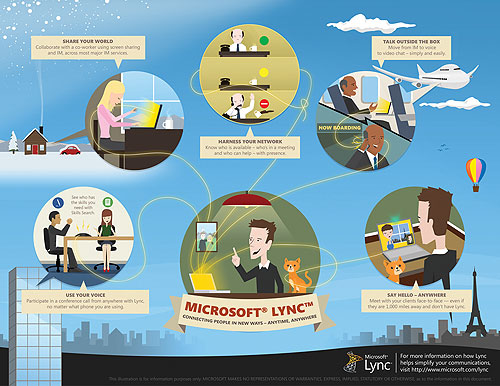HOUSTON – Jan. 18, 2011 – The oil and gas industry has realized that keeping information flowing among its workers is key to continued flow in its pipelines.
According to a survey released today at Microsoft’s Global Energy Forum in Houston, oil and gas professionals are relying more than ever on collaboration – and real-time collaboration tools like social networking – to get their jobs done and remain competitive within their industry. The survey, conducted by Microsoft and Accenture, shows that the global nature of the oil and gas industry is driving the demand for real-time information and knowledge sharing, said Craig Hodges, Microsoft’s general manager of U.S. Manufacturing and Resources.

During the Global Energy Forum, attendees saw how Microsoft Lync helps people collaborate in new ways across the PC, phone and browser.
“Whether it’s in the same office building or across the globe, these folks have a strong need for collaboration both inside and outside of their companies,” Hodges said. “This industry is very concerned about safety and security, but these results show big progress in the area of collaboration.”
The survey of 205 professionals at oil- and gas-related companies from around the world found that nearly three-fourths are using social media tools for business collaboration, a significant increase over last year’s survey responses (62 percent). Overall, professionals are collaborating more than ever, with 34 percent reporting that they are collaborating more this year than last.
“Only 24 months ago, none of this would have been on people’s radar screens,” Hodges said. “But today 84 percent of respondents said that they have the ability to contact colleagues anytime, from anyplace, on any device. To me, that’s a pretty strong indicator of great momentum in adoption of these tools.”

Craig Hodges, Microsoft’s general manager of U.S. Manufacturing and Resources.
The goal of the survey, the third annual survey commissioned by Microsoft and Accenture, was to capture what is driving increased collaboration among oil and gas professionals and determine current thinking about the business value of collaboration tools to enhance processes and workflows. Hodges said the results support industry trends and build upon the feedback from last year’s survey. They also helped identify areas where cloud services can drive collaboration and innovation.
“The industry is beginning to wake up to see the cloud as a vehicle to drive their business and increase collaboration,” he said. “Cloud computing holds enormous promise not only in accelerating the implementation and adoption of technology, but also in creating the ability for oil and gas professionals to collaborate around the world.” That means greater business agility and increased operational efficiency and profitability, he added.
As the geographical and demographic landscape of the oil and gas industry continues to evolve, the workforce will require new technologies that better connect people, data and resources across continents and supply chains, Hodges said. The energy sector faces some of the biggest management problems on the planet – wild swings in supply and demand, volatile prices, and shifting worldwide energy policies have made oil and gas exploration and production more complex than ever.
At the Global Energy Forum, Microsoft is showcasing how its products can help companies face these challenges. “Our technology toolkit is well-suited to be applied to the problems these companies face day in and day out,” Hodges said.
At the conference, companies will learn how they can use Windows Phone 7 to build applications that enable them to do business on a smartphone, for example. Microsoft Lync will be used to illustrate the benefits of unified communications and presence. And attendees will see how Microsoft StreamInsight can help companies uncover hidden patterns of data to provide insights and help solve problems.
Several Microsoft partners will talk about their experiences with Microsoft technologies. For example, a member of the board of directors at Bharat Petroleum, one of India’s largest companies, will use Lync to give a video presentation on its use of Microsoft’s unified communications tools. Shell will talk about its use of Microsoft Online Services to drive its vision for increased collaboration. And Chevron and industry standards group Energistics will showcase their experience with the Windows Azure platform and SQL Azure to utilize data more effectively.
Hodges said that the push toward unifying communications in the cloud will likely continue as oil and gas professionals becoming increasingly spread out around the world.
“Like every other industry, oil and gas companies are trying to do more with less, and it becomes even more important to move strategically and swiftly,” he said. “This is especially true in the oil and gas industries, where the availability of natural resources is constantly in flux and decision-making – often between business units spread across the globe – needs to happen swiftly. The cloud can address this need with flexibility, agility and cost efficiency.”




